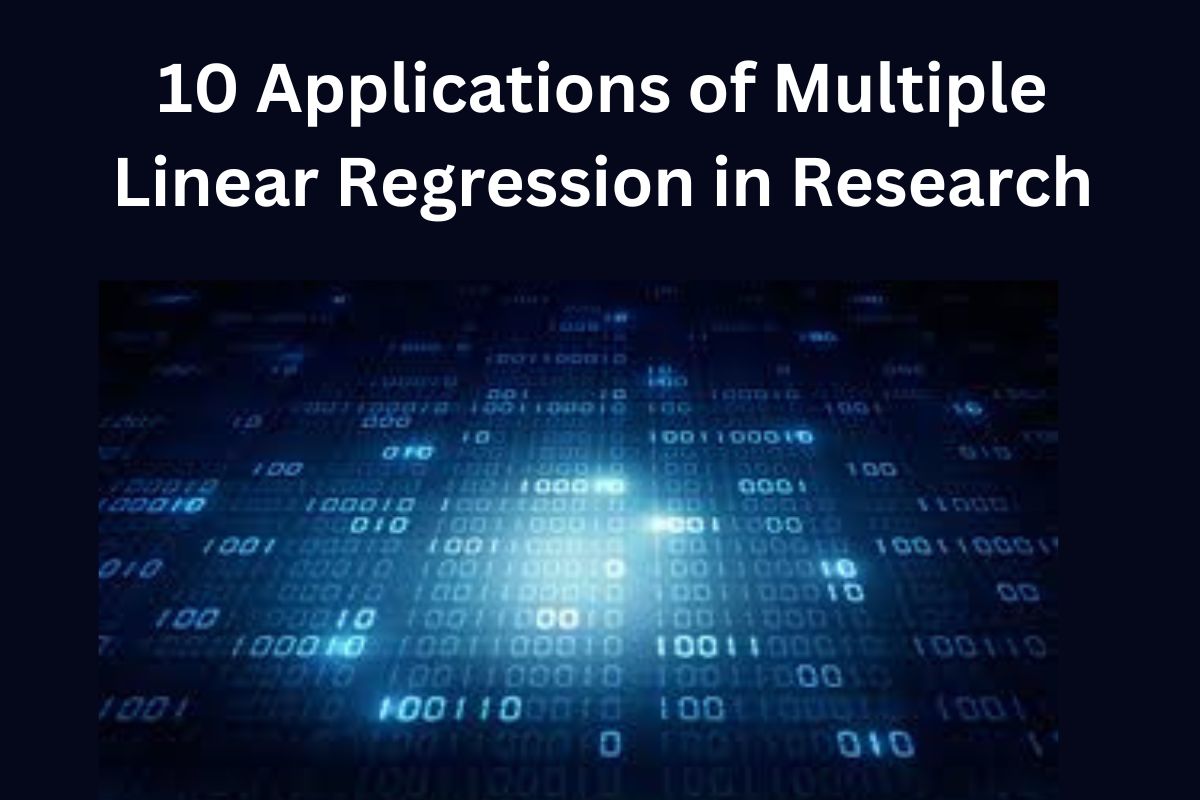Introduction
Multiple Linear Regression (MLR) is a powerful statistical technique used to understand the relationship between one dependent variable and two or more independent variables. By analyzing these relationships, researchers can predict outcomes, identify trends, and make informed decisions.
What is Multiple Linear Regression?
Multiple Linear Regression is a statistical technique used to model the relationship between one dependent variable and two or more independent variables. It estimates how changes in the independent variables are associated with changes in the dependent variable, allowing for predictions and insights into complex data patterns. This method fits a linear equation to observed data.
Ten key applications of MLR in research
1. Predicting Economic Trends
Researchers use MLR to forecast economic indicators like GDP growth, unemployment rates, or inflation. By examining multiple factors such as interest rates, consumer spending, and government policies, MLR models help economists predict future economic conditions. For instance, a model might combine data on consumer confidence, business investment, and global economic factors to forecast GDP growth.
2. Assessing Health Outcomes
In healthcare research, MLR can analyze how various factors influence health outcomes. For example, researchers might study how age, diet, physical activity, and genetics affect the risk of developing chronic diseases like diabetes. By understanding these relationships, they can identify high-risk groups and develop targeted prevention strategies.
3. Evaluating Educational Success
Educational researchers use MLR to examine factors that impact student performance. Variables such as socioeconomic status, parental involvement, teaching methods, and school resources can be included in the model. This helps in understanding how different factors contribute to academic achievement and can guide policies to improve educational outcomes.
4. Understanding Environmental Impacts
MLR is also used to study environmental issues. For instance, researchers might explore how factors like industrial activity, urbanization, and climate change affect air quality or biodiversity. By analyzing these relationships, MLR models can help in crafting effective environmental policies and conservation strategies.
5. Optimizing Marketing Strategies
In marketing research, MLR helps companies understand how various factors influence sales and customer behavior. Variables such as advertising expenditure, product features, pricing strategies, and market trends can be analyzed to optimize marketing strategies and improve business performance. For example, a company might use MLR to determine how changes in advertising spending affect overall sales.
6. Improving Financial Forecasting
Financial analysts use MLR to forecast stock prices, assess risk, and make investment decisions. By analyzing factors like interest rates, economic indicators, and company performance metrics, MLR models can provide insights into future market trends and guide investment strategies.
7. Analyzing Social Issues
Social scientists use MLR to study complex social phenomena. For example, they might investigate how income level, education, and employment status influence social mobility or quality of life. MLR helps in identifying key factors that affect social issues and can support the development of effective social policies.
8. Enhancing Product Development
In product development, MLR is used to understand how different features and design elements impact customer satisfaction and product success. For instance, a company might analyze how various product attributes like price, quality, and brand reputation influence consumer preferences. This helps in designing products that better meet customer needs.
9. Investigating Political Behavior
Political scientists use MLR to explore factors influencing voting behavior and public opinion. Variables such as demographic characteristics, political ideology, and media exposure can be analyzed to understand how they affect voter preferences and election outcomes. This information can be valuable for campaign strategies and policy-making.
10. Advancing Agricultural Research
Agricultural researchers apply MLR to study the effects of different factors on crop yields and farming practices. Variables such as soil quality, weather conditions, and fertilizer use can be analyzed to optimize agricultural practices and improve crop production. MLR helps in developing strategies for sustainable farming and addressing food security challenges.
Best Data Analytics Training in Delhi, Noida, Ghaziabad, and Other Nearby Cities in India
To effectively leverage Multiple Linear Regression and other data analytics techniques, specialized training is crucial. If you’re interested in mastering MLR and other data analytics skills, consider enrolling in reputable data analytics training programs. Here are some Institute which provides the Best Data Analytics Training in Delhi, Noida, Ghaziabad, and nearby cities:
- Delhi
- Uncodemy: Offers comprehensive data analytics courses, including MLR, with hands-on projects and industry insights.
- AnalytixLabs: Provides in-depth training in data analytics and machine learning, including MLR, with real-world applications.
- Noida
- Data Science Dojo: Features data analytics courses with a focus on practical skills, including MLR and predictive modeling.
- SkillUp Online: Offers flexible online and in-person training programs in data analytics and machine learning.
- Ghaziabad
- Techved Academy: Provides data analytics courses that cover multiple regression techniques and data interpretation.
- Data Science India: Offers specialized training in data analytics, including MLR, with expert instructors and practical sessions.
- Other Nearby Cities
- Gurgaon: DataTrained offers data analytics programs with a focus on MLR and other advanced techniques.
- Faridabad: SimpliLearn provides comprehensive data analytics training, including modules on MLR and predictive analysis.
Conclusion
Multiple Linear Regression is a versatile tool with broad applications across various fields. By analyzing the relationships between multiple variables, researchers can gain valuable insights, make accurate predictions, and inform decision-making processes. Whether predicting economic trends, assessing health outcomes, or optimizing marketing strategies, MLR provides a robust framework for understanding complex data and addressing real-world challenges.


